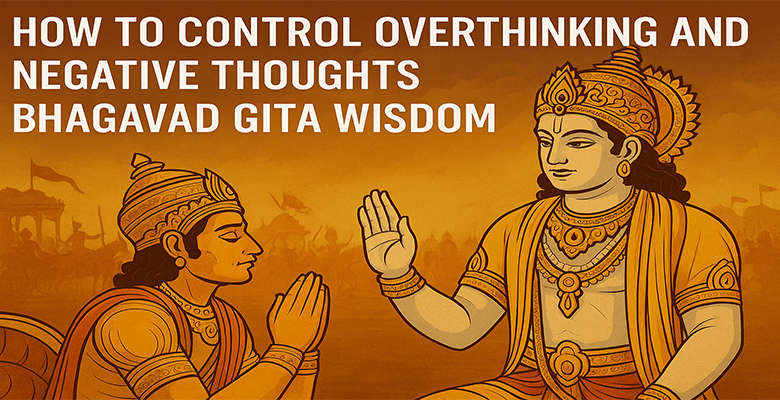How to Control Overthinking and Negative Thoughts Bhagavad Gita Wisdom

How to Control Overthinking and Negative Thoughts Bhagavad Gita Wisdom
In today’s world, the real battle is not outside, but inside our minds. Overthinking and negative thoughts sneak in silently — turning small doubts into massive stress and blocking our peace and clarity. But what if you could find timeless advice to deal with this mental storm — not from a modern therapist, but from a 5000-year-old scripture?
Yes, the Bhagavad Gita, a divine conversation between Lord Krishna and warrior Arjuna during the epic battle of Kurukshetra, is not just a religious text — it’s a powerful psychological guide. When Arjuna was overwhelmed by fear, doubt, and mental chaos, Krishna didn’t give him a weapon — He gave him wisdom.
Here’s how the Bhagavad Gita helps you deal with overthinking and negative thoughts:
Contents
1. Accept That the Mind Is Naturally Restless
In Chapter 6, Verse 34, Arjuna says:
“चञ्चलं हि मन: कृष्ण प्रमाथि बलवद् दृढम्।
तस्याहं निग्रहं मन्ये वायोरिव सुदुष्करम्॥”
Translation: The mind is restless, powerful, and difficult to control — like trying to control the wind.
Doesn’t this sound exactly like overthinking?
Key Takeaways:
- Don’t judge yourself for having too many thoughts. It’s normal.
- Krishna says that with practice (abhyasa) and detachment (vairagya), the mind can be trained.
- Your mind is like a muscle — it becomes stronger with effort and discipline.
2. Practice Detachment, Not Disinterest
One of the most misunderstood teachings of the Gita is detachment. It doesn’t mean running away from your duties. Krishna teaches us to stay fully committed — but not obsessed with results.
Overthinking usually comes from worrying about outcomes like:
- What if I fail?
- What if they don’t like me?
- What if I make a mistake?
Krishna says in Bhagavad Gita 2.47:
“कर्मण्येवाधिकारस्ते मा फलेषु कदाचन।”
Translation: You have a right to perform your actions, but not to the results.
Key Takeaways:
- Do your best, but stop trying to control every result.
- Let go of expectations — it brings peace and confidence.
- Detachment reduces anxiety and clears mental noise.
3. Focus on the Present Moment (Karma Yoga)
Krishna emphasizes Karma Yoga — the path of selfless action. This means putting your full attention into the present task, without worrying about rewards.
Overthinking loves an idle or distracted mind. But when you’re fully absorbed in the moment, the mind stops wandering.
Key Takeaways:
- Whether you’re cooking, working, or even just walking — do it mindfully.
- Staying present is like meditation in action.
- One focused action is stronger than 100 scattered thoughts.
4. Rise Above the Likes and Dislikes of the Mind
In Chapter 2, Verse 38, Krishna tells Arjuna:
“सुखदुःखे समे कृत्वा लाभालाभौ जयाजयौ।
ततो युद्धाय युज्यस्व नैवं पापमवाप्स्यसि॥”
Translation: Treat happiness and sorrow, gain and loss, victory and defeat alike — and fight your inner battle.
Our mind constantly labels everything as “good” or “bad,” which creates stress and negative self-talk like:
- I’m not good enough.
- They’re better than me.
- I always fail.
Key Takeaways:
- Observe your thoughts instead of believing them blindly.
- Ask: “Is this absolutely true?”
- Don’t suppress negative thoughts — watch them without reacting.
5. Meditation: The Gita’s Mental Reset Button
In Chapter 6, Verse 5, Krishna says:
“उद्धरेदात्मनाऽऽत्मानं नात्मानमवसादयेत्।
आत्मैव ह्यात्मनो बन्धुरात्मैव रिपुरात्मन:॥”
Translation: Let a person lift himself by his own mind. The mind can be your best friend or your worst enemy.
Krishna teaches Dhyana Yoga — the path of meditation. Meditation creates space between you and your thoughts, allowing you to respond instead of reacting.
Key Takeaways:
- Start with 10 minutes of deep breathing every day.
- Don’t fight your thoughts — gently bring focus back to your breath.
- With time, the mind calms down and gains clarity.
The Battlefield Is Within
Krishna never removed Arjuna from the battlefield. Instead, He changed how Arjuna saw it. That’s the real power of the Gita — transforming your relationship with your mind.
Remember:
- The mind is not your enemy — it’s a tool. Learn to use it wisely.
- Even warriors like Arjuna had doubts and fears.
- The peace you seek isn’t far — it’s within you.
Frequently Asked Questions
Q. What does the Bhagavad Gita say about overthinking?
The Gita teaches that the mind is naturally restless, but with practice (abhyasa) and detachment (vairagya), you can control it.
Q. Can the Gita help with anxiety and depression?
Yes. The teachings offer deep psychological guidance — letting go of fear, acting with clarity, and living purposefully.
Q. What is the core message of the Bhagavad Gita?
Self-realization through action, devotion, and discipline. It teaches how to remain stable in both success and failure.
Q. Is the Bhagavad Gita relevant today?
Absolutely! It deals with emotional control, anxiety, fear, purpose, and clarity — challenges we all face daily.
Q. Where can I read the Bhagavad Gita?
You can read it online at https://www.holy-bhagavad-gita.org or find printed versions in Hindi and English in bookstores.
Return to Stillness
Whenever your mind feels like a battlefield, return to the wisdom of the Gita. Like Krishna guided Arjuna, these teachings can help you rise above your inner noise.
Be patient. Be present. Be peaceful.
For more inspiring content like this, keep visiting BharatDetails.com.

